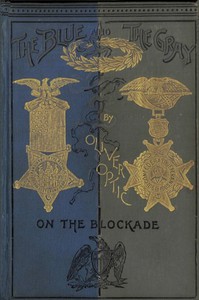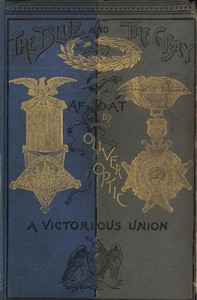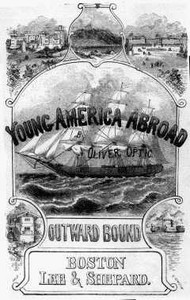On The Blockade, Oliver Optic [best affordable ebook reader txt] 📗

- Author: Oliver Optic
Book online «On The Blockade, Oliver Optic [best affordable ebook reader txt] 📗». Author Oliver Optic
"Done something? I should say that you had done it all," added Flint.
"I did my share. The vessels of the navy have generally been named after a system, though it has often been varied. Besides the names of states and cities, the names of rivers have been given to vessels. The Bronx is the name of a small stream, hardly more than a brook, in West Chester County, New York. When I was a small boy, my father had a country place on its banks, and I did my first paddling in the water in the Bronx. I liked the name, and my father recommended it."
"I don't object to the name, though somehow it makes me think of a walnut cracked in your teeth when I hear it pronounced," added Flint. "Now that I know what it is and what it means, I shall take more kindly to it, though I am afraid we shall get to calling her the Bronxy before we have done with her, especially if she gets to be a pet, for the name seems to need another syllable."
41 "Young men fall in love with girls without regard to their names."
"That's so. A friend of mine in our town in Maine fell in love with a young lady by the name of Leatherbee; but she was a very pretty girl and her name was all the objection I had to her," said Flint, chuckling.
"But that was an objection which your friend evidently intended to remove at no very distant day," suggested Christy.
"Very true; and he did remove it some years ago. What was that noise?" asked the first lieutenant, suddenly rising from his seat.
Christy heard the sounds at the same moment. He and his companion in the cabin had been talking about the Scotian and the Arran, and what his father had said to him about prudence in speaking of his movements came to his mind. The noise was continued, and he hastened to the door of his state room, and threw it open. In the room he found Dave hard at work on the furniture; he had taken out the berth sack, and was brushing out the inside of the berth. The noise had been made by the shaking of the slats on which the mattress rested. Davis Talbot, the cabin steward 42 of the Bronx, had been captured in the vessel when she was run out of Pensacola Bay some months before. As he was a very intelligent colored man, or rather mulatto, though they were all the same at the South, the young commander had selected him for his present service; and he never had occasion to regret the choice. Dave had passed his time since the Teaser arrived at New York at Bonnydale, and he had become a great favorite, not only with Christy, but with all the members of the family.
"What are you about, Dave?" demanded Christy, not a little astonished to find the steward in his room.
"I am putting the room in order for the captain, sir," replied Dave with a cheerful smile, such as he always wore in the presence of his superiors. "I found something in this berth I did not like to see about a bed in which a gentleman is to sleep, and I have been through it with poison and a feather; and I will give you the whole southern Confederacy if you find a single redback in the berth after this."
"I am very glad you have attended to this matter at once, Dave."
43 "Yes, sir; Captain Folkner never let me attend to it properly, for he was afraid I would read some of his papers on the desk. He was willing to sleep six in a bed with redbacks," chuckled Dave.
"Well, I am not, or even two in a bed with such companions. How long have you been in my room, Dave?" added Christy.
"More than two hours, I think; and I have been mighty busy too."
"Did you hear me when I came into the cabin?"
"No, sir, I did not; but I heard you talking with somebody a while ago."
"What did I say to the other person?"
"I don't know, sir; I could not make out a word, and I didn't stop in my work to listen. I have been very busy, Captain Passford," answered Dave, beginning to think he had been doing something that was not altogether regular.
"Don't you know what we were talking about, Dave?"
"No, sir; I did not make out a single word you said," protested the steward, really troubled to find that he had done something wrong, though he had not the least idea what it was. "I did not mean to do anything out of the way, Captain Passford."
44 "I have no fault to find this time, Dave."
"I should hope not, sir," added Dave, looking as solemn as a sleepy owl. "I would jump overboard before I would offend you, Massa Christy."
"You need not jump overboard just yet," replied the captain, with a pleasant smile, intended to remove the fears of the steward. "But I want to make a new rule for you, Dave."
"Thank you, sir; if you sit up nights to make rules for me, I will obey all of them; and I would give you the whole State of Florida before I would break one of them on purpose, Massa Christy."
"Massa Christy!" exclaimed the captain, laughing.
"Massa Captain Passford!" shouted Dave, hastening to correct his over-familiarity.
"I don't object to your calling me Christy when we are alone, for I look upon you as my friend, and I have tried to treat you as a gentleman, though you are a subordinate. But are you going to be a nigger again, and call white men 'Massa?' I told you not to use that word."
"I done forget it when I got excited because I was afraid I had offended you," pleaded the steward.
45 "Your education is vastly superior to most people of your class, and you should not belittle yourself. This is my cabin; and I shall sometimes have occasion to talk confidentially with my officers. Do you understand what I mean, Dave?"
"Perfectly, Captain Passford: I know what it is to talk confidently and what it is to talk confidentially, and you do both, sir," replied the steward.
"But I am sometimes more confidential than confident. Now you must do all your work in my state room when I am not in the cabin, and this is the new rule," said Christy, as he went out of the room. "I know that I can trust you, Dave; but when I tell a secret I want to know to how many persons I am telling it. You may finish your work now;" and he closed the door.
Christy could not have explained why he did so if it had been required of him, but he went directly to the door leading out into the companion way, and suddenly threw it wide open, drawing the portière aside at the same time. Not a little to his surprise, for he had not expected it, he found a man there; and the intruder was down 46 on his knees, as if in position to place his ear at the keyhole. This time the young commander was indignant, and without stopping to consider as long as the precepts of his father required, he seized the man by the collar, and dragged him into the cabin.
"What are you doing there?" demanded Christy in the heat of his indignation.
The intruder, who was a rather stout man, began to shake his head with all his might, and to put the fore finger of his right hand on his mouth and one of his ears. He was big enough to have given the young commander a deal of trouble if he had chosen to resist the force used upon him; but he appeared to be tame and submissive. He did not speak, but he seemed to be exerting himself to the utmost to make himself understood. Flint had resumed his seat at the table, facing the door, and in spite of himself, apparently, he began to laugh.
"That is Pink Mulgrum, Captain Passford," said he, evidently to prevent his superior from misinterpreting the lightness of his conduct. "As you are aware, he is deaf and dumb."

Mulgrum at the captain's door.
"I see who he is now," replied Christy, who 47 had just identified the man. "He may be deaf and dumb, but he seems to have a great deal of business at the door of my cabin."
"I have no doubt he is as deaf as the keel of the ship, and I have not yet heard him speak a word," added the first lieutenant. "But he is a stout fellow, very patriotic, and willing to work."
"All that may be, but I have found him once before hanging around that door to-day."
At this moment Mulgrum took from his pocket a tablet of paper and a pencil, and wrote upon it, "I am a deaf mute, and I don't know what you are talking about." Christy read it, and then wrote, "What were you doing at the door?" He replied that he had been sent by Mr. Lillyworth to clean the brasses on the door. He was then dismissed.
48 CHAPTER IV A DEAF AND DUMB MYSTERYAs he dismissed Mulgrum, Christy tore off the leaf from the tablet on which both of them had written before he handed it back to the owner. For a few moments, he said nothing, and had his attention fixed on the paper in his hand, which he seemed to be studying for some reason of his own.
"That man writes a very good hand for one in his position," said he, looking at the first lieutenant.
"I had noticed that before," replied Flint, as the commander handed him the paper, which he looked over with interest. "I had some talk with him on his tablet the day he came on board. He strikes me as a very intelligent and well-educated man."
"Was he born a deaf mute?" asked Christy.
"I did not think to ask him that question; but I judged from the language he used and his rapid 49 writing that he was well educated. There is character in his handwriting too; and that is hardly to be expected from a deaf mute," replied Flint.
"Being a deaf mute, he can not have been shipped as a seaman, or even as an ordinary steward," suggested the captain.
"Of course not; he was employed as a sort of scullion to be worked wherever he could make himself useful. Mr. Nawood engaged him on the recommendation of Mr. Lillyworth," added Flint, with something like a frown on his brow, as though he had just sounded a new idea.
"Have you asked Mr. Lillyworth anything about him?"
"I have not; for somehow Mr. Lillyworth and I don't seem to be very affectionate towards each other, though we get along very well together. But Mulgrum wrote out for me that he was born in Cherryfield, Maine, and obtained his education as a deaf mute in Hartford. I learned the deaf and dumb alphabet when I was a schoolmaster, as a pastime, and I had some practice with it in the house where I boarded."
"Then you can talk in that way with Mulgrum."
50 "Not a bit of it; he knows nothing at all about the deaf and dumb alphabet, and could not spell out a single word I gave him."
"That is very odd," added the captain musing.
"So I thought; but he explained it by saying that at the school they were changing this method of communication for that of actually speaking and understanding what was said by observing the vocal organs. He had not remained long enough to master this method; in fact he had done all his talking with his tablets."
"It is a little strange that he should not have learned either method of communication."
"I thought so myself, and said as much to him; but he told me that he had inherited considerable property at the death of his father, and he was not inclined to learn new tricks," said Flint. "He is intensely patriotic, and said that he was willing to give himself and all his property for the salvation of his country. He had endeavored to obtain a position as captain's clerk, or something of that sort, in the navy; but failing of this, he had been willing to go to





Comments (0)